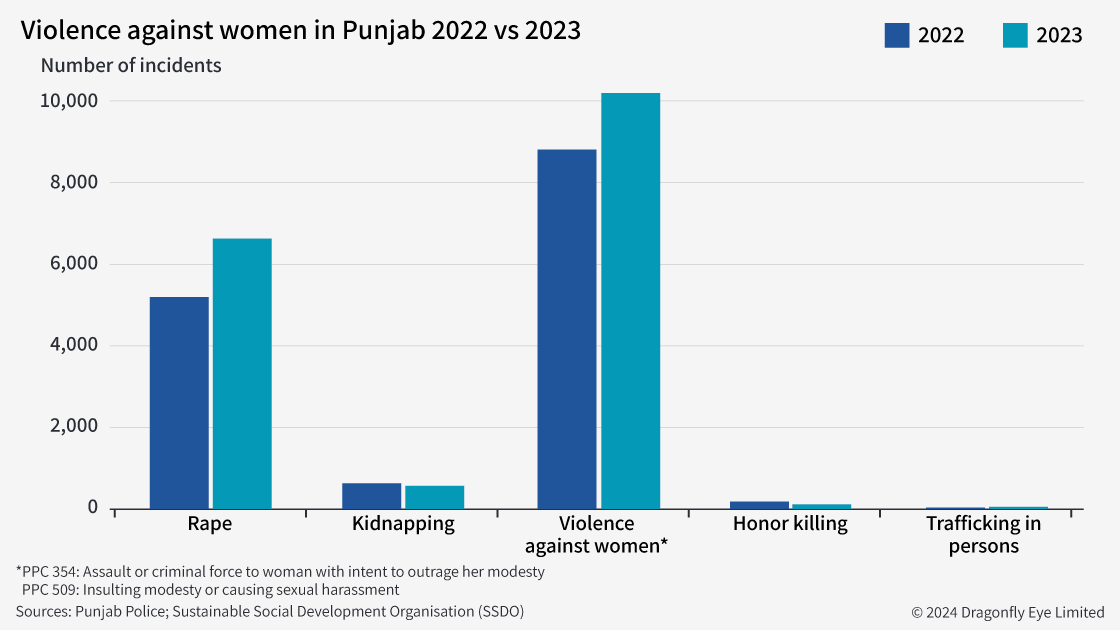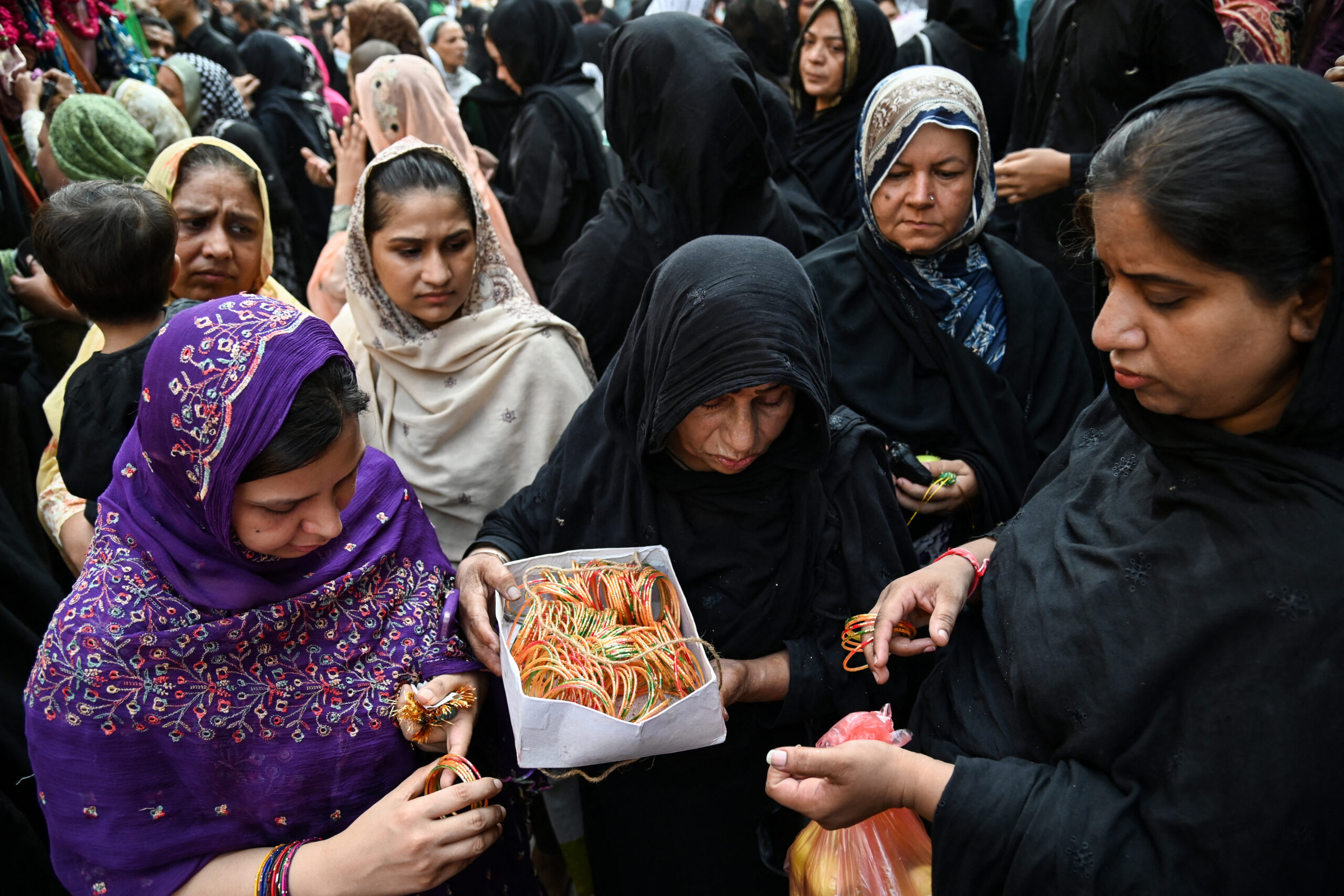Female travellers to and residents in Pakistan are likely to face a high risk of catcalling and ogling
This assessment was issued to clients of Dragonfly’s Security Intelligence & Analysis Service (SIAS) on 12 August 2024.
- Reported official data shows that cases of violent crime against women and rape have increased over the past few years, particularly in Punjab province
- Harassment seems to occur especially in crowded marketplaces and public transport, while sexual assaults seem most common in isolated areas
Women living in and travelling to Pakistan are likely to face a high risk of sexual harassment and gender-based violence in 2024 and beyond. These have long been endemic issues in the country. Most assault and rape cases this year have reportedly involved local nationals, but foreigners have also been victimised in recent years. Still, we assess that verbal harassment is the main day-to-day gender-specific security risk for female travellers, particularly those travelling alone.
High risk of sexual harassment and gender-based violence
Sexual harassment and assaults of women are likely to remain prevalent in Pakistan. The authorities do not publish up-to-date or comprehensive data on this. But several studies over the past few years have shown that most women have experienced harassment in public places and at work. For instance, a March 2021 report by a local NGO shows that 85% of surveyed women in the Sindh, Punjab and Balochistan provinces had experienced sexual harassment in places such as parks or buses.
Reported cases of violent crime against women seem to be rising, particularly in Punjab and Sindh province. According to a report by a local NGO published in March and citing local police data, there were 10,201 cases of violence against women reported in Punjab in 2023, including rape. This represents a 14.5% increase compared with 2022 (8,787 incidents) and is also the highest increase in this type of violence recorded in Pakistan for a province in 2023.
Recent local media reports citing police data have also pointed towards a similarly worsening trend. The actual occurrence of rape and violence against women is almost certainly higher than reported. Most Pakistani women do not tend to report such crimes because of social stigma and ‘ineffective and harmful responses by police’, according to an international human rights NGO.

In Punjab province, Lahore is the most unsafe city for women. That is based on the above-mentioned data from 2023. Most incidents of violence against women recorded in any one city in the province took place there. And based on recent reported sexual assault figures in Lahore, we doubt this situation will significantly improve. For instance, according to one usually reliable local media outlet, the police had already recorded 235 cases of sexual assault against women in the first four months of this year.
Risks of harassment on the streets
We assess verbal harassment and ogling are likely to be the main gender-specific risks for female travellers to Pakistan. Several foreign governments warn that verbal harassment especially against solo female travellers is common. In the experience of a female Dragonfly analyst who travelled to Islamabad, Rawalpindi and Lahore in July, groups of young men also often stare and approach women who are with other women for photos and follow them. The analyst added that this was probably partly due to curiosity, but such intimidating behaviour was less pronounced when travelling with men.

Verbal and physical sexual harassment seem to be most common in crowded public spaces and public transport, irrespective of the time of day. This is based on the previously mentioned report published by the local NGO in 2021, and recent perceptions of several female travel bloggers. These suggest that unwanted approaches and catcalling by local men often occur in busy marketplaces such as Ichhra Bazar in Lahore, and other tourist sites and public transport, rather than in more upmarket and business districts. The Dragonfly analyst agreed with this, based on their experience.

Sexual assaults, including rape, are still a serious concern for female travellers and expats. Most cases involve local women, but foreigners have also been targeted in recent years. The Canadian government advises women to be ‘vigilant’ in less crowded areas and ‘when dealing with strangers or recent acquaintances’. Based on our media monitoring, assault cases seem to take place most frequently in secluded areas, such as parks, or quieter suburbs such as Korangi in Karachi. And more rarely in taxis; in August, a ride-hailing app driver reportedly sexually assaulted a lone female passenger in Lahore.
Official efforts fall short
We doubt that protections for women in Pakistan will improve any time soon. This is despite the authorities’ recent efforts to crack down on crime against women, including by installing CCTV cameras in city centres. Ineffective police and legal systems and very low conviction rates mean criminals will continue to operate with impunity. In April, the US state department said that while ‘rape was frequent, prosecutions were rare’ in 2023. And recent local reports suggest there has been very little improvement since 2020 when a Karachi-based advocacy NGO estimated a 3% conviction rate for rape cases.
Image: Image: Women distribute ornaments to unmarried women as a part of a South Asian tradition on 7th Muharram mehndi in the memory of Hazrat Qasim, during a religious procession at Mochi gate in Lahore, Pakistan, on 14 July 2024. Photo by Amna Yaseen/AFP via Getty Images.




